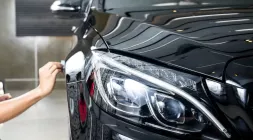How to Protect Your Car During Coronavirus Pandemic
Because of the Coronavirus, car owners are burdened with the task of caring for their vehicles.
Though no one ever wanted it to happen, the world’s economic state has greatly been affected by the pandemic. But for typical citizens, the issue is bigger than the number say about the economy’s state, yet, there’s not much we can do about it.
With governments all over the world resulting in quarantines and lockdowns, people have no choice but to stay home. That means no trips, no vacations and no unnecessary gatherings. This also means vehicles are stuck in garages for some time. They, however, will still require care.

The world’s economic state has greatly been affected by the pandemic
Because of the Coronavirus, people from all over the world are restricted from going outside. Some people use this time to relax and re-energize and connect with their loved ones.
Sadly, car owners are burdened with the task of caring for their vehicles. Philcarnews.com listed some of the common questions that bother car owners regarding car care amid the Coronavirus pandemic.
Question: If I don’t drive my car, will the batteries become defective?
According to experts, the car part that will most likely be affected by inactivity for a long time is the car batteries. Most vehicles today are made with multiple computer components that draw power from one source.
That is the car battery. Even when your vehicle is not in use, these computers still draw out energy in small whiffs. If you let your vehicle sit in the garage for, let’s say, about two weeks, your car battery is bound to die.

The car part that will most likely be affected by inactivity for a long time is the car batteries
To prevent your car battery from draining and completely dying out, you would need to start your car up. Do this at least once a week.
Make sure to let the engine run for about 5 to 10 minutes. If you have a dedicated garage at home, make sure you run the engine while the garage door is wide open.
This will make sure that the exhaust fumes don’t end up in your lungs. You can also use a battery tender to maintain the battery’s proper voltage. You would need to make sure that the battery is disconnected before driving off.
>>> Related: 6 common reasons why your car battery drains
Question: Is the gas in my car’s tank going to go bad?
Gasoline, like most other objects in the world, decreases in quality over time. But these days, most modern fuel systems are sealed. This preserves the life of fuels in tanks by minimizing oxidation.
But even with those types of systems around, the service life of gasoline can vary. Experts say that some gasoline brands can stay good up to a whole month.
While there are also those that can last up to half a year. But those estimates only apply to full tanks where gas-tank condensation is heavily reduced.
If you are severely bothered by the gas in your car going bad, you can use a fuel stabilizer. This can be used to treat your fuel and extend its storage life for up to two years.
>>> Related: Safety Driving Tips to be Safe from the Coronavirus

Experts say that some gasoline brands can stay good up to a whole month
Question: Are the brakes something I should worry about?
If you refrain from driving your vehicle for a long time, the brake rotors can accumulate rust. Even if it is stored indoors, exposure to rust-causing elements can’t be prevented. In fact, it only takes days for rust to start to accumulate on these metal parts.
Whenever you drive, rust particles can get into your vehicle’s brake pad lining. This will create an annoying noise. This can also result in brake-pedal pulsation and uneven braking.
But if you can still manage to make short drives at least once a week, the chances of rust build-up can be reduced.

If you refrain from driving your vehicle for a long time, the brake rotors can accumulate rust
Your parking brake can also be a source of problems. If you haven’t used it in quite a while, you may find it difficult to release. But just like regular car brakes, it can be kept in a good operating state through regular use.
You can also try releasing and applying the parking brakes to prevent rust buildup. Thanks to the invention of cable-activated brakes, they are less prone to rust.
>>> Related: 10 steps to master and take as soon as the car brake fails
Question: Do I need to check the tire pressure?
Adequate tire pressure is vital to the health of your vehicle. If you want your car to run optimally, you will need to make sure that there is enough air in the tires. As you may already know, tires have a tendency to lose air over time. This is completely normal.
That’s why even if your car is stuck in the garage, you need to inspect the tires every now and then using a TPM. Once checked, make sure it’s filled with air in accordance with the set recommendations by the manufacturer.
Vehicles that are kept in storage for a long time are at risk of having flat spots. Like most of the systems, we discussed earlier, driving your vehicle for some time will help with the situation. But then again, you can also always add extra air if your vehicle won’t be mobile for some time.

Adequate tire pressure is vital to the health of your vehicle
A tip from an AAA repair systems manager is to add 5 to 10 lbs of air than you normally would. This will effectively prevent your tire from having flat spots.
Just keep in mind that when the quarantine is all over, you would need to make sure that the tires are, again, well inflated according to the manufacturer’s specifications.
This is usually printed on the sticker that you can find at the driver’s doorjamb. The numbers printed at the tire’s sidewall is actually the maximum air pressure that your tire can handle.
>>> Related: 4 things to remember for your car's tire maintenance
Question: Can I set back the oil change schedule while I’m on quarantine?
Just because the city where you live is on lockdown, doesn’t mean you can skip an oil change. If the vehicle is let alone, the oil scheduled in the reservoir will deteriorate. This can be caused by temperature fluctuations.
If you don’t know how much time you can wait between oil changes, you can check the owner’s manual. There is also a mileage interval that you can follow. But since you’re under quarantine, you won’t be able to drive your vehicle a lot so this would be irrelevant.

Just because the city where you live is on lockdown, doesn’t mean you can skip an oil change
RECENT ARTICLES









